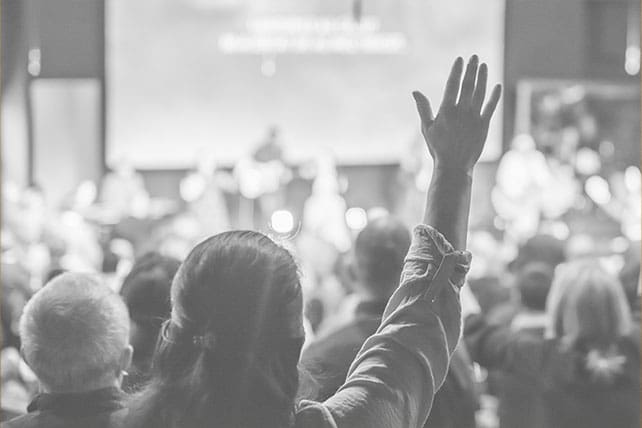This reflection on what is congregational worship comes from Ed Steele:
Congregational worship is more than just a group of individuals having quiet times in the same place. It is the Body of Christ gathered together in unity and diversity centering adoration on the King of kings and Lord of lords and responding in obedience to Him. Congregation worship places the emphasis not upon “my personal experience,” but “our obedient response” to His revealed nature and character.
To understand where all of this started, I must go back to an email from Eric Benoy, our librarian at the seminary, who really helped me begin to start thinking about congregation worship.
We gather together for corporate worship; a group of people to do something in one accord. If that is the case, then why do some worship leaders today want to make corporate worship a personal experience? It is oxymoronic in a way. If we have gathered intentionally for corporate worship, then should we not then be striving for a corporate offering of praise, adoration, et al and hear from God as a body of believers? We have come together specifically to be the church gathered; to worship and become equipped to be the church scattered. [4/16/2010, used by permission]
Besides being our librarian, and a fine one at that, Eric is a pastor and a dear godly friend whose opinion is worth the time to ponder. I’m not sure I had spent much time thinking about the efforts being made to make “corporate worship” a “personal experience,” but the more I began to mull over the idea in my mind, the more I began to see some of the possible ramifications of the idea.
RELATED: When “Worship” Is Just Singing
What Is Congregational Worship?
Biblical worship is God-centered. Scripture describes it as “in Him, through Him, by Him, to Him, and about Him,” that is, the focus of worship is Christ, not our tastes, style, opinions, etc. If we look at the Isaiah 6 model, as God takes the initiative and reveals Himself, the prophet not only sees the revealed nature of God, but sees himself as God sees him, sinful and unclean. He confesses and is forgiven and the prophet is able to hear God’s voice: “Whom shall I send? Who will go for us?” Worship then completes itself in obedient response as Isaiah responds, “Here am I, Lord, send me!”
How does all that fit into congregational worship? A great question. The idea of the “congregation” is in reference to the “church,” not the church building, but the Body of Christ, the Bride of Christ. This body, whose Head is Christ, Himself, is seen in worship in the book of Revelation as thousands upon thousands are gathered around the Lamb on His throne. He is the one central and only focus. Angelic beings circle around Him declaring His nature and glory, hallowed saints cast their crowns toward the One who is worthy. If we could look around at the worshipers in heaven, we would notice that it is multi-generational worship: Not only are there throngs of believers from all the ages, generation after generation, but old and young. It is also multi-cultural worship: tribes from every tongue and nation lifting praise and adoration to God.
In Acts 2:42 we read that “They were devoting themselves to the apostles’ teaching and to fellowship, to the breaking of bread and to prayer.” [NET] There may be discussion as to what exactly is meant by each of these four activities, but central to each is the fact that they were done corporately. Paul deals with the abuses of the agape feast and the Lord’s Supper in I Corinthians 11, emphasizing the need for self examination, so that when they came together they would not be condemned. It is not by accident that he then deals with spiritual gifts and explains that they are each members of Christ’s body, each with different gifts for the building of the body. In I Corinthians 14, Paul deals with the fact that worship was participatory: “When you come together, each one has a song, has a lesson, has a revelation, has a tongue, has an interpretation. Let all these things be done for the strengthening of the church.” [14:26 NET] The focus was not on building up the individual participating, but the body as a whole.
A simple focus on the pronouns in the Model Prayer that Jesus left us in Matthew 6:9-13 will also help us see that the corporate emphasis: This, then, is how you should pray:
‘Our Father in heaven, hallowed be your name, your kingdom come, your will be done, on earth as it is in heaven. Give us today our daily bread. And forgive us our debts, as we also have forgiven our debtors. And lead us not into temptation, but deliver us from the evil one. [bold type added]
It may be that because we live in a culture that prizes individualism we look at Scripture with “individualistic” lenses. While it is true that we come to Christ as individuals, our “cultural lenses” may filter the importance of seeing ourselves as the Body with Christ as its Head and as the Bride preparing herself for the Bridegroom. Though we are aware that this theme is central to the New Testament idea of the church, what implications are there to worship? Where does the church “see” itself as a the “Body of Christ” and not just a group of individuals? Is it not as believers gather for worship and join together unifying their focus on the Risen Lord?

